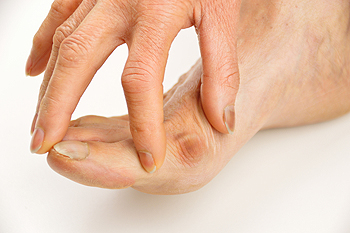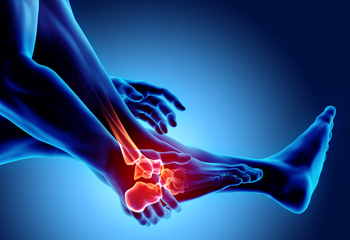Connect With Us
Blog
Items filtered by date: November 2020
How Rheumatoid Arthritis Affects the Feet and Ankles
Rheumatoid arthritis (RA) is an autoimmune disorder that causes the body’s immune system to attack the lining of the joints. This leads to joint pain, as well as weakened tendons and ligaments. RA often affects the joints of the feet and ankles, especially in the early stages of the disease. Symptoms of this condition include painful, swollen, and stiff joints. Over time, RA can also change the position of joints, leading to misalignment and a decrease in joint function and range of motion. The earlier RA is detected and diagnosed, the earlier treatment can begin. Early treatment can prevent RA symptoms from worsening. If you have RA and experience foot and ankle symptoms, it is suggested that you are under the care of a podiatrist, who can help you manage this condition and stay on your feet.
Because RA affects more than just your joints, including the joints in your feet and ankles, it is important to seek early diagnosis from your podiatrist if you feel like the pain in your feet might be caused by RA. For more information, contact Dr. Royall of Mountain View Foot & Ankle Clinic. Our doctor will assist you with all of your podiatric concerns.
What Is Rheumatoid Arthritis?
Rheumatoid Arthritis (RA) is an autoimmune disorder in which the body’s own immune system attacks the membranes surrounding the joints. Inflammation of the lining and eventually the destruction of the joint’s cartilage and bone occur, causing severe pain and immobility.
Rheumatoid Arthritis of the Feet
Although RA usually attacks multiple bones and joints throughout the entire body, almost 90 percent of cases result in pain in the foot or ankle area.
Symptoms
- Swelling and pain in the feet
- Stiffness in the feet
- Pain on the ball or sole of feet
- Joint shift and deformation
Diagnosis
Quick diagnosis of RA in the feet is important so that the podiatrist can treat the area effectively. Your doctor will ask you about your medical history, occupation, and lifestyle to determine the origin of the condition. Rheumatoid Factor tests help to determine if someone is affected by the disease.
If you have any questions please feel free to contact our office located in Lehi, UT . We offer the newest diagnostic and treatment technologies for all your foot and ankle needs.
Bunions May Develop for Several Reasons
 There are several reasons why bunions may develop. These can include genetic factors, wearing shoes that do not fit correctly, a foot deformity, or from a medical condition like arthritis. A bunion is defined as a bone that protrudes from the joint in the big toe, and may cause severe pain and discomfort. Additional symptoms of a bunion can consist of swelling and redness surrounding the affected joint, and the toe may be difficult to move. After a proper diagnosis is made, which generally involves having an X-ray taken and a physical examination of the foot is performed, proper treatment can begin. Orthotics may be prescribed and it is beneficial to wear shoes that have low heels and a wide toe box. If your bunion is very painful or causing difficulty walking, it is strongly suggested that you are examined by a podiatrist.
There are several reasons why bunions may develop. These can include genetic factors, wearing shoes that do not fit correctly, a foot deformity, or from a medical condition like arthritis. A bunion is defined as a bone that protrudes from the joint in the big toe, and may cause severe pain and discomfort. Additional symptoms of a bunion can consist of swelling and redness surrounding the affected joint, and the toe may be difficult to move. After a proper diagnosis is made, which generally involves having an X-ray taken and a physical examination of the foot is performed, proper treatment can begin. Orthotics may be prescribed and it is beneficial to wear shoes that have low heels and a wide toe box. If your bunion is very painful or causing difficulty walking, it is strongly suggested that you are examined by a podiatrist.
If you are suffering from bunions, contact Dr. Royall of Mountain View Foot & Ankle Clinic. Our doctor can provide the care you need to keep you pain-free and on your feet.
What Is a Bunion?
A bunion is formed of swollen tissue or an enlargement of boney growth, usually located at the base joint of the toe that connects to the foot. The swelling occurs due to the bones in the big toe shifting inward, which impacts the other toes of the foot. This causes the area around the base of the big toe to become inflamed and painful.
Why Do Bunions Form?
Genetics – Susceptibility to bunions are often hereditary
Stress on the feet – Poorly fitted and uncomfortable footwear that places stress on feet, such as heels, can worsen existing bunions
How Are Bunions Diagnosed?
Doctors often perform two tests – blood tests and x-rays – when trying to diagnose bunions, especially in the early stages of development. Blood tests help determine if the foot pain is being caused by something else, such as arthritis, while x-rays provide a clear picture of your bone structure to your doctor.
How Are Bunions Treated?
- Refrain from wearing heels or similar shoes that cause discomfort
- Select wider shoes that can provide more comfort and reduce pain
- Anti-inflammatory and pain management drugs
- Orthotics or foot inserts
- Surgery
If you have any questions, please feel free to contact our office located in Lehi, UT . We offer the newest diagnostic and treatment technologies for all your foot care needs.
It's Time for Beautiful Feet
What Can Cause an Achilles Tendon Injury?
 Patients who have experienced an Achilles tendon injury are often aware of the severe pain and discomfort this can cause. It can occur from repetitive irritation, or from a sudden injury. Additionally, wearing shoes that do not fit correctly, or having an abnormal foot structure may contribute to the onset of this type of injury. The symptoms that are often associated with this condition can consist of extreme tenderness in the heel, calf, and ankle, and it can be difficult to walk. It is beneficial to consult with a podiatrist if you have endured an Achilles tendon injury. A podiatrist can guide you toward the right treatments for you.
Patients who have experienced an Achilles tendon injury are often aware of the severe pain and discomfort this can cause. It can occur from repetitive irritation, or from a sudden injury. Additionally, wearing shoes that do not fit correctly, or having an abnormal foot structure may contribute to the onset of this type of injury. The symptoms that are often associated with this condition can consist of extreme tenderness in the heel, calf, and ankle, and it can be difficult to walk. It is beneficial to consult with a podiatrist if you have endured an Achilles tendon injury. A podiatrist can guide you toward the right treatments for you.
Achilles tendon injuries need immediate attention to avoid future complications. If you have any concerns, contact Dr. Royall of Mountain View Foot & Ankle Clinic. Our doctor can provide the care you need to keep you pain-free and on your feet.
What Is the Achilles Tendon?
The Achilles tendon is a tendon that connects the lower leg muscles and calf to the heel of the foot. It is the strongest tendon in the human body and is essential for making movement possible. Because this tendon is such an integral part of the body, any injuries to it can create immense difficulties and should immediately be presented to a doctor.
What Are the Symptoms of an Achilles Tendon Injury?
There are various types of injuries that can affect the Achilles tendon. The two most common injuries are Achilles tendinitis and ruptures of the tendon.
Achilles Tendinitis Symptoms
- Inflammation
- Dull to severe pain
- Increased blood flow to the tendon
- Thickening of the tendon
Rupture Symptoms
- Extreme pain and swelling in the foot
- Total immobility
Treatment and Prevention
Achilles tendon injuries are diagnosed by a thorough physical evaluation, which can include an MRI. Treatment involves rest, physical therapy, and in some cases, surgery. However, various preventative measures can be taken to avoid these injuries, such as:
- Thorough stretching of the tendon before and after exercise
- Strengthening exercises like calf raises, squats, leg curls, leg extensions, leg raises, lunges, and leg presses
If you have any questions please feel free to contact our office located in Lehi, UT . We offer the newest diagnostic tools and technology to treat your foot and ankle needs.
Blog Archives
- May 2025
- April 2025
- March 2025
- February 2025
- January 2025
- December 2024
- November 2024
- October 2024
- September 2024
- August 2024
- July 2024
- June 2024
- May 2024
- April 2024
- March 2024
- February 2024
- January 2024
- December 2023
- November 2023
- October 2023
- September 2023
- August 2023
- July 2023
- June 2023
- May 2023
- April 2023
- March 2023
- February 2023
- January 2023
- December 2022
- November 2022
- October 2022
- September 2022
- August 2022
- July 2022
- June 2022
- May 2022
- April 2022
- March 2022
- February 2022
- January 2022
- December 2021
- November 2021
- October 2021
- September 2021
- August 2021
- July 2021
- June 2021
- May 2021
- April 2021
- March 2021
- February 2021
- January 2021
- December 2020
- November 2020
- October 2020


